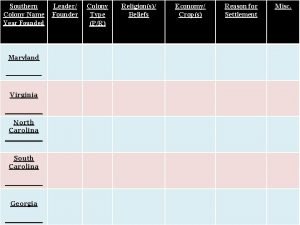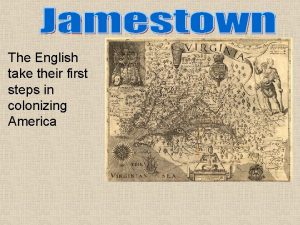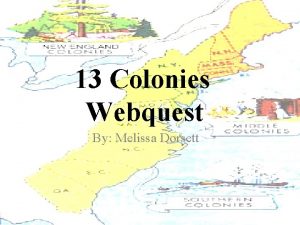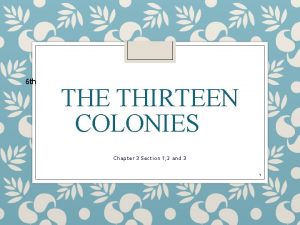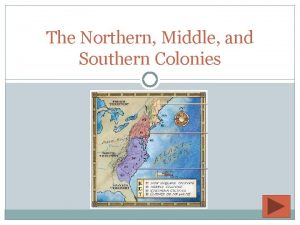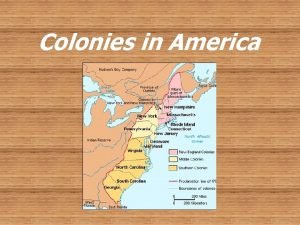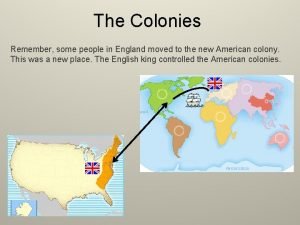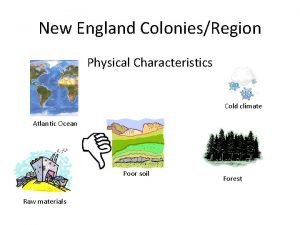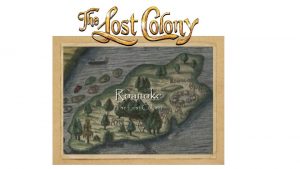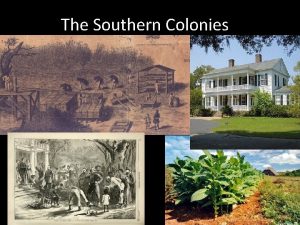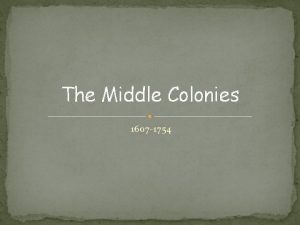The Southern Colonies 1607 1754 The Lost Colony












- Slides: 12

The Southern Colonies 1607 -1754


The Lost Colony � A century after Columbus landed in the Caribbean, Europe’s seagoing nations were in full competition for the possible “riches” of the new world � England was latecomer to this race � Spain had already entered into what is now Florida and New Mexico � English pirates had been up and down the east coast of what is now the U. S. since 1562 � A colony was not seriously considered until 1578 when Sir Humphrey Gilbert received a charter from Queen Elizabeth “to inhabit and possess…all remote and heathen lands not in actual possession of any Christian prince” � After Gilbert died on his second voyage, Sir Walter Raleigh, his half-brother, decided to carry out the venture

The Lost Colony �England’s motives for settling the New World � Establish a base to loot French and Spanish shipping � Visions of gold and copper mines and cash crops � An attempt to find the Northwest Passage � Spread the new Protestant religion among the “savages”

The Lost Colony � 1584 -Philip Amadas and Arthur Barlowe � 1585 -Ralph Lane, Richard Grenville, Thomas Harriot, John White � 1586 -John White � 1590 -John White returns


Jamestown/Virginia � 1607 the London/Virginia Company arrived on the James River with 104 settlers; London company was a joint-stock company � Investors hoped to find gold or silver, or a northwest passage to Asia � James river became contaminated every summer and produced dysentery, typhoid fever, malaria � Colony had too many gentlemen who considered farming beneath them � Captain John Smith turned the colony around by concentrating on survival

Jamestown/Virginia � Colony suffered a setback in the winter of 1610 -”starving time” and an Indian war with the Powhatan � 1613 -Colony offered first strand of “brown gold”-tobacco under the leadership of John Rolfe � By 1619 the Virginia House of Burgesses had become the first representative government body in the new world � Company started the “headright system”; a colonist received 50 acres of land for each person who passage to Virginia he paid for; these people were considered indentured servants

Trouble in VA – Bacon’s Rebellion � More conflicts with Native Americans caused the Virginia royal governor to increase taxes and restricted expansion into Native territory � After defeating the Natives, Nathaniel Bacon led a group or poor indentured servants against leadership in Jamestown in September 1676 � Significance � Colonists would not tolerate a corrupt government � The poor (both black and white) could unite � Increase in African slave trade

Maryland � In 1632, the English king gave George Calvert land north of Virginia. Calvert was a Roman Catholic who wanted a colony for people of his faith. � King made him baron Baltimore and “lord proprietor” of the colony � Lord Baltimore’s regime overthrown several times by Protestants � Approved Toleration Act of 1649 granting freedom of worship to all Christians

Southern Colonies �Most southern colonists lived on the land. In North Carolina, farms tended to be small. �In Virginia and Maryland, large farms called plantations developed. �Tobacco was the common crop. In South Carolina and Georgia, planters raised rice and indigo. � Plantation owners lived in great comfort. Enslaved Africans, however, endured poverty, violence and a lack of freedom.

 Luke 15:11-35
Luke 15:11-35 Southern colony religion
Southern colony religion Map of the lost colony of roanoke
Map of the lost colony of roanoke The lost colony of roanoke
The lost colony of roanoke The lost colony of roanoke
The lost colony of roanoke Melissa dorsett
Melissa dorsett Southern colonies
Southern colonies Northern middle southern colonies
Northern middle southern colonies Southern colonies
Southern colonies New england confederation
New england confederation North middle and southern colonies
North middle and southern colonies Southern colonies physical characteristics
Southern colonies physical characteristics Sports in colonial america
Sports in colonial america

